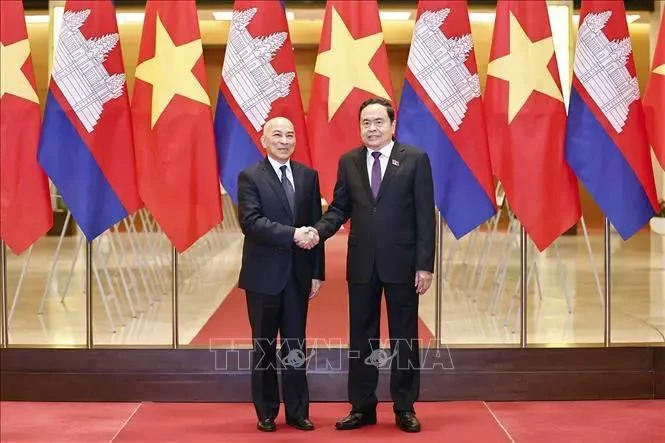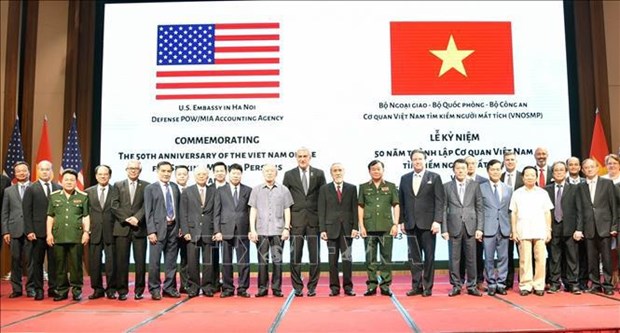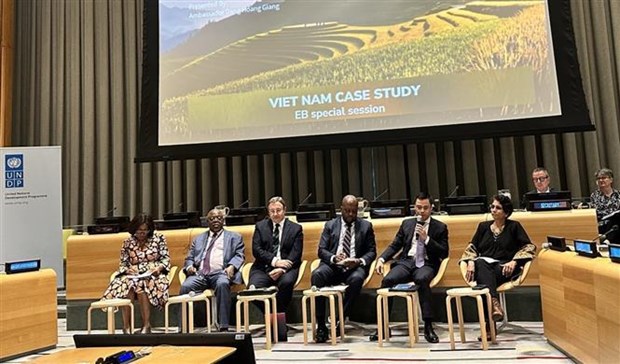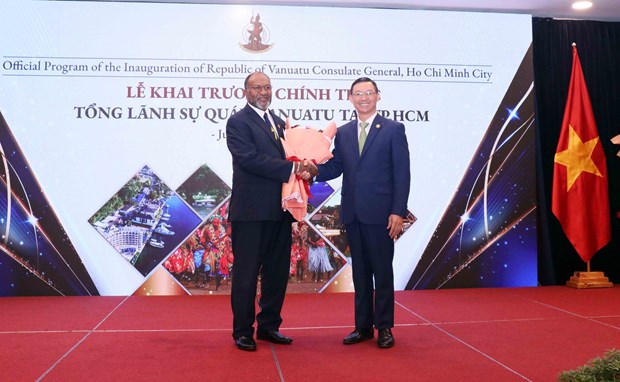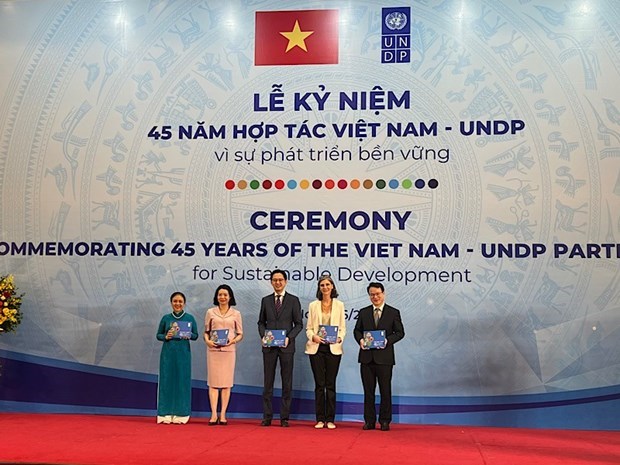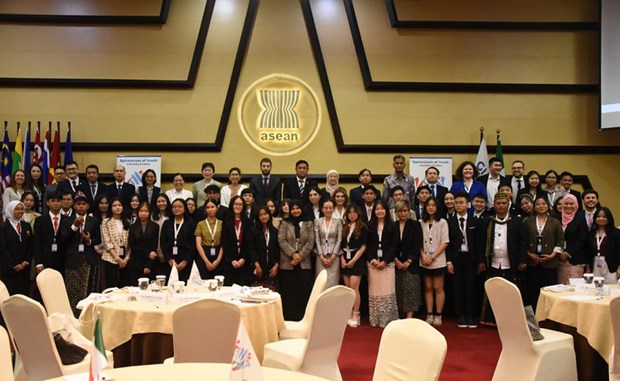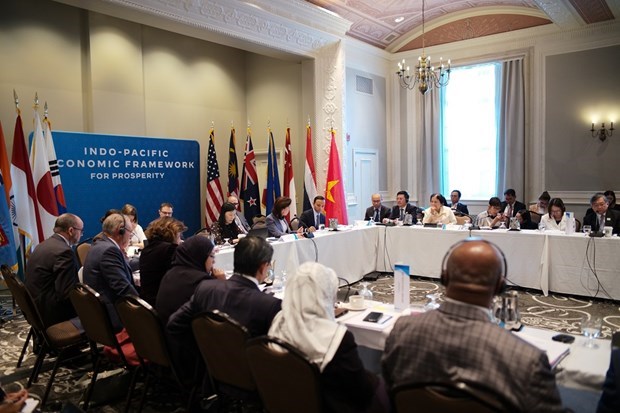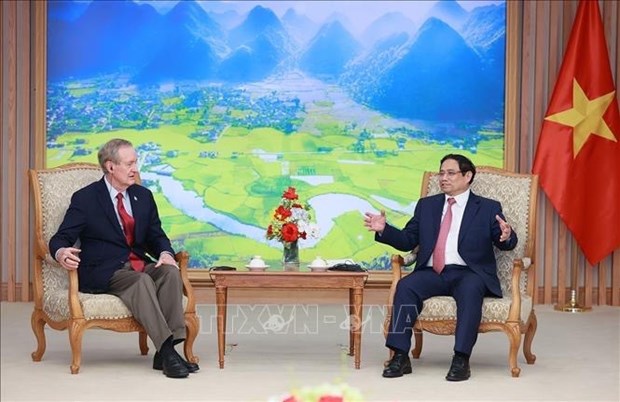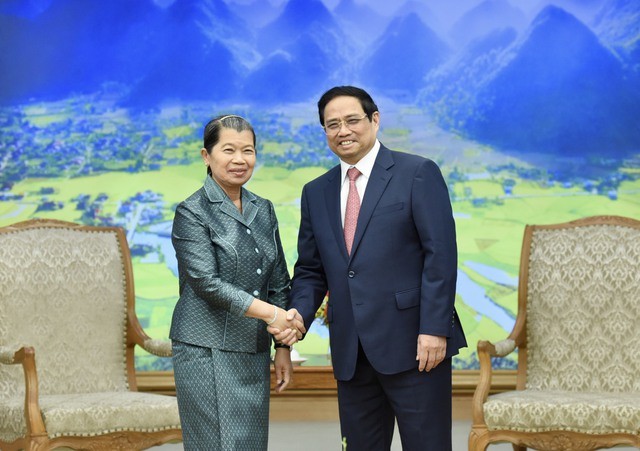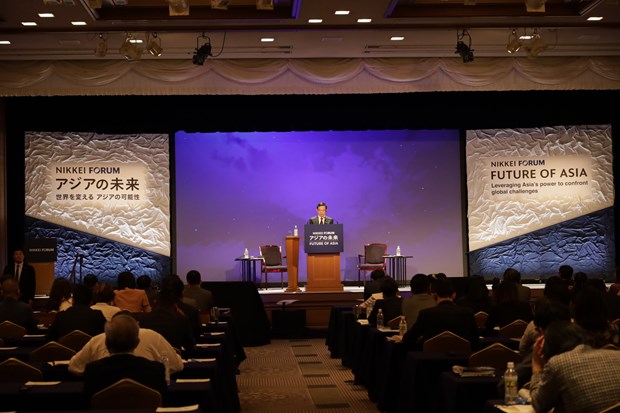Vietnamese Party leader hosts Australian Prime Minister
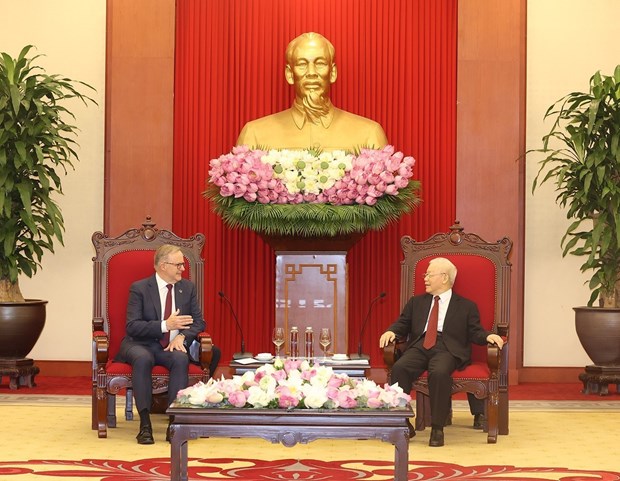
Party General Secretary Nguyen Phu Trong (right) meets leader of the Australian Labour Party and PM of Australia Anthony Albanese in Hanoi on June 4. (Photo: VNA)
Party General Secretary Nguyen Phu Trong received leader of the Australian Labour Party and Prime Minister of Australia Anthony Albanese in Hanoi on June 4.
Welcoming Albanese on his official visit to Vietnam when the two countries are marking the 50th anniversary of their diplomatic ties, Trong affirmed the importance Vietnam attaches to the relations with Australia and highly valued the strong, substantive, and comprehensive development of bilateral cooperation over the past years.
He stressed that both countries, located in the Asia-Pacific and sharing many similarities, have enjoyed thriving relations over the last 50 years which have been expanded and become substantive in terms of politics, economy, science, technology, education - training and defence - security. In particular, people-to-people links are close with more than 300,000 Vietnamese people, including tens of thousands of students, in Australia.
Based on those conditions and the huge cooperation potential, there are bright prospect for relations between the two countries to grow further in the coming time, he opined.
General Secretary Trong highly valued the outcomes of Albanese’s visit, especially the talks and meetings with Vietnamese leaders and the important agreements reached during the trip. He described the successes of this visit and the recent trip of Vietnam by Australian Governor-General David Hurley as milestones in bilateral relations.
The Vietnamese Party leader voiced his support for the orientations for developing the countries’ ties, including lifting their relations to a new level, cooperating more fruitfully, and promoting the implementation effectiveness of agreements for the sake of the two peoples as well as for peace, cooperation, and development in the region and the world at large.
For his part, PM Albanese stated his country respects Vietnam’s role and stature along with bilateral connections, expressing his delight at the impressive achievements of their relations, which are currently a strategic partnership. He noted that he believes in the development prospects of bilateral relations and hopes to elevate those ties to a comprehensive strategic partnership.
The PM affirmed Australia’s viewpoint on the importance of consolidating a peaceful and stable environment in the region; respecting international law, independence and sovereignty of countries, and equal relations; supporting ASEAN’s centrality, as well as the Australian Government’s policy and the Australian Labour Party’s policy of promoting relations with Southeast Asian nations.
Welcoming Albanese on his official visit to Vietnam when the two countries are marking the 50th anniversary of their diplomatic ties, Trong affirmed the importance Vietnam attaches to the relations with Australia and highly valued the strong, substantive, and comprehensive development of bilateral cooperation over the past years.
He stressed that both countries, located in the Asia-Pacific and sharing many similarities, have enjoyed thriving relations over the last 50 years which have been expanded and become substantive in terms of politics, economy, science, technology, education - training and defence - security. In particular, people-to-people links are close with more than 300,000 Vietnamese people, including tens of thousands of students, in Australia.
Based on those conditions and the huge cooperation potential, there are bright prospect for relations between the two countries to grow further in the coming time, he opined.
General Secretary Trong highly valued the outcomes of Albanese’s visit, especially the talks and meetings with Vietnamese leaders and the important agreements reached during the trip. He described the successes of this visit and the recent trip of Vietnam by Australian Governor-General David Hurley as milestones in bilateral relations.
The Vietnamese Party leader voiced his support for the orientations for developing the countries’ ties, including lifting their relations to a new level, cooperating more fruitfully, and promoting the implementation effectiveness of agreements for the sake of the two peoples as well as for peace, cooperation, and development in the region and the world at large.
For his part, PM Albanese stated his country respects Vietnam’s role and stature along with bilateral connections, expressing his delight at the impressive achievements of their relations, which are currently a strategic partnership. He noted that he believes in the development prospects of bilateral relations and hopes to elevate those ties to a comprehensive strategic partnership.
The PM affirmed Australia’s viewpoint on the importance of consolidating a peaceful and stable environment in the region; respecting international law, independence and sovereignty of countries, and equal relations; supporting ASEAN’s centrality, as well as the Australian Government’s policy and the Australian Labour Party’s policy of promoting relations with Southeast Asian nations.
President receives Australian Prime Minister
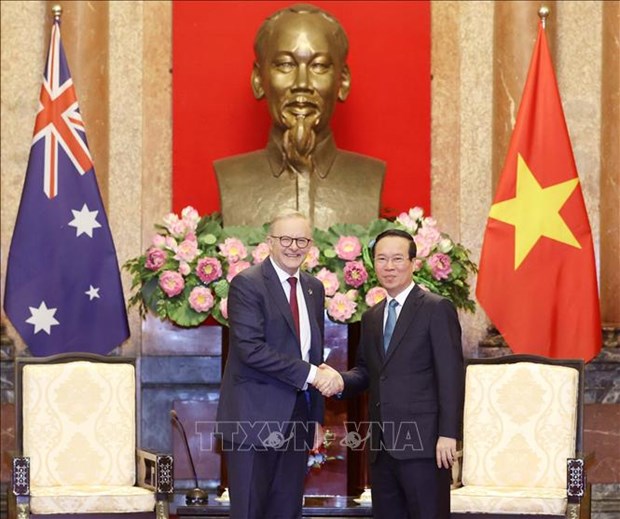
President Vo Van Thuong (R) and Australian Prime Minister Anthony Albanese at their meeting on June 4 (Photo: VNA)
President Vo Van Thuong appreciated Australia's provision of stable official development assistance (ODA) for Vietnam and its support in the prevention and control of the COVID-19 epidemic through timely grant of vaccines in large quantities.
For his part, Albanese affirmed that Vietnam has always been Australia's top priority partner in the region and wished to constantly develop cooperative relations with the Southeast Asian nation.
Vietnam will have a priority position in a Southeast Asia Economic Strategy to 2040 that the Australian Government is developing, he noted.
The leaders expressed their delight at the outstanding achievements of the bilateral ties across various fields, especially politics-foreign affairs, security-defence, economy-trade-investment, education-training, culture, tourism, sports, labour, science-technology, and people-to-people and locality-to-locality exchanges.
Albanese informed his host on Australia’s decision to grant 105 million AUD (69.51 million USD) for Vietnam serving cooperation in climate change response and energy transition; the RMIT University’s increase of investment in Vietnam to 250 million AUD; and the Western Sydney University’s granting of scholarships for Vietnamese and regional students.
The Australian PM said he welcomes the opening of more direct routes to major Australian cities by Vietnamese carriers Vietnam Airlines and Vietjet, which he said contributes to promoting economic and tourism cooperation, and exchange activities between the two peoples.
President Thuong, in turn, proposed Australia create favourable conditions for the Vietnamese community in Australia to preserve the language, traditions, and culture of their home country, and for Vietnamese students to complete visa procedures and study. He also suggested Australia establish more branches of its major universities in Vietnam; and soon implement the revised memorandum of understanding on the Australian Agriculture Visa programme.
Vietnam is ready to provide skilled workers in the industrial, agricultural and service sectors for Australia, and welcomes Australian citizens to participate in the Vietnamese work and holiday programme, he stated.
Discussing regional and international issues, the two sides concurred to continue to support each other and work closely at regional and international forums, especially the UN, APEC, ASEAN and other ASEAN-led mechanisms. Albanese reaffirmed Australia's stance of respecting the rule of law in the region and settling disputes in the East Sea by peaceful means in conformity with international law, especially the 1982 United Nations Convention on the Law of the Sea (UNCLOS).
For his part, Albanese affirmed that Vietnam has always been Australia's top priority partner in the region and wished to constantly develop cooperative relations with the Southeast Asian nation.
Vietnam will have a priority position in a Southeast Asia Economic Strategy to 2040 that the Australian Government is developing, he noted.
The leaders expressed their delight at the outstanding achievements of the bilateral ties across various fields, especially politics-foreign affairs, security-defence, economy-trade-investment, education-training, culture, tourism, sports, labour, science-technology, and people-to-people and locality-to-locality exchanges.
Albanese informed his host on Australia’s decision to grant 105 million AUD (69.51 million USD) for Vietnam serving cooperation in climate change response and energy transition; the RMIT University’s increase of investment in Vietnam to 250 million AUD; and the Western Sydney University’s granting of scholarships for Vietnamese and regional students.
The Australian PM said he welcomes the opening of more direct routes to major Australian cities by Vietnamese carriers Vietnam Airlines and Vietjet, which he said contributes to promoting economic and tourism cooperation, and exchange activities between the two peoples.
President Thuong, in turn, proposed Australia create favourable conditions for the Vietnamese community in Australia to preserve the language, traditions, and culture of their home country, and for Vietnamese students to complete visa procedures and study. He also suggested Australia establish more branches of its major universities in Vietnam; and soon implement the revised memorandum of understanding on the Australian Agriculture Visa programme.
Vietnam is ready to provide skilled workers in the industrial, agricultural and service sectors for Australia, and welcomes Australian citizens to participate in the Vietnamese work and holiday programme, he stated.
Discussing regional and international issues, the two sides concurred to continue to support each other and work closely at regional and international forums, especially the UN, APEC, ASEAN and other ASEAN-led mechanisms. Albanese reaffirmed Australia's stance of respecting the rule of law in the region and settling disputes in the East Sea by peaceful means in conformity with international law, especially the 1982 United Nations Convention on the Law of the Sea (UNCLOS).
Top legislator of Vietnam meets with visiting Australian PM
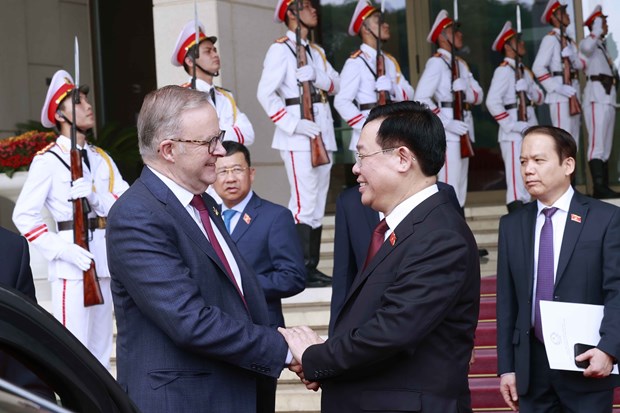
NA Chairman Vuong Dinh Hue (R) welcomes Australian PM Anthony Albanese in Hanoi on June 4 (Photo: VNA)
Chairman Hue shared his guest’s view that there remains much room for the two countries to enhance cooperation, noting on the basis of free trade agreements, including the Comprehensive and Progressive Agreement for Trans-Pacific Partnership (CPTPP), they can bolster trade and investment ties.
He suggested that aside from maintaining existing supply chains, the countries should create new ones to diversify their markets. The Vietnamese parliament supports the two countries to strengthen trade and investment partnerships and hopes that more Australian investors will come to operate in Vietnam, he remarked.
PM Albanese welcomed his host’s recommendations for the two sides to hold more workshops, meetings, and events to share experience in adapting to the Fourth Industrial Revolution, and to increase exchanges to boost mutual understanding between the countries’ legislators and parliaments.
He said that in his position, he will help promote locality-to-locality ties so that both sides can record even better results.
PM chairs welcome ceremony for Australian counterpart
PM Albanese welcomed his host’s recommendations for the two sides to hold more workshops, meetings, and events to share experience in adapting to the Fourth Industrial Revolution, and to increase exchanges to boost mutual understanding between the countries’ legislators and parliaments.
He said that in his position, he will help promote locality-to-locality ties so that both sides can record even better results.
PM chairs welcome ceremony for Australian counterpart
Prime Minister Pham Minh Chinh and his Australian counterpart Anthony Albanese agreed to elevate their countries’ relations to a new level in the future during their talks in Hanoi on June 4 morning.
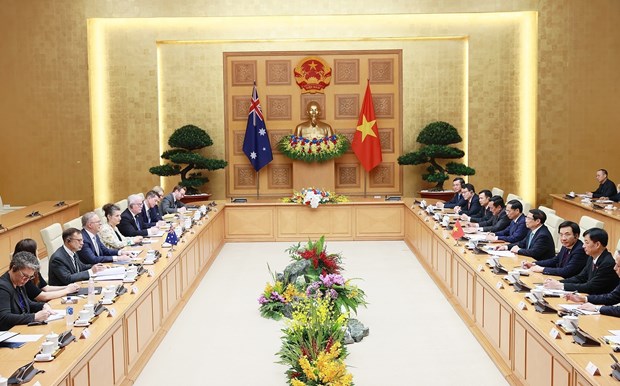
The talks between Vietnamese PM Pham Minh Chinh and his Australian counterpart Anthony Albanese in Hanoi on June 4. (Photo: VNA)
PM Albanese noted his country treasures the Strategic Partnership with Vietnam and views Vietnam as a centre during the building of its strategy on relations with Southeast Asia.
Both host and guest noted with satisfaction the flourishing relations in all fields between their countries.
High-ranking mutual visits and meetings have been held frequently. The action plan for implementing the Strategic Partnership for 2020 - 2023 have borne fruit. Bilateral trade approximated 16 billion USD in 2022, up 30% from the previous year, turning the two sides into one of the 10 biggest trading partners of each other. Security and defence cooperation has become increasingly effective and substantive, especially in training and assisting with United Nations peacekeeping operations and fighting transnational crimes and cybercrime. Partnerships in agriculture, education - training, labour, and people-to-people exchanges have also been thriving, they said.
Both host and guest noted with satisfaction the flourishing relations in all fields between their countries.
High-ranking mutual visits and meetings have been held frequently. The action plan for implementing the Strategic Partnership for 2020 - 2023 have borne fruit. Bilateral trade approximated 16 billion USD in 2022, up 30% from the previous year, turning the two sides into one of the 10 biggest trading partners of each other. Security and defence cooperation has become increasingly effective and substantive, especially in training and assisting with United Nations peacekeeping operations and fighting transnational crimes and cybercrime. Partnerships in agriculture, education - training, labour, and people-to-people exchanges have also been thriving, they said.
Following the talks, the two PMs witnessed the exchange of four cooperation documents between their countries, namely a memorandum of understanding (MoU) on setting up the ministerial-level dialogue mechanism on trade; an MoU on implementing the second phase of the Aus4Innovation Programme in Vietnam; the one on exchanging financial intelligence information related to money laundering and terrorism sponsorship; and another on granting scholarships for students of Vietnam and the region between the University of Economics Ho Chi Minh City and the Western Sydney University. Certificates of Vietnam Airlines and Vietjet’s opening of more direct air routes between the two countries were also presented on this occasion.
* Within the framework of the visit, PM Albanese and the Australian delegation had a wide range of activities such as laying wreaths in tribute to late President Ho Chi Minh at his mausoleum in Hanoi, visited the women’s football teams of Australia and Vietnam, visited RMIT University and enjoyed Vietnamese sandwich "banh mi" and drank "bia hoi", a locally brewed beer often used by Hanoians on hot summer days.
Australian Prime Minister Anthony Albanese and his entourage left Hanoi on June 4 evening, concluding a two-day official visit to Vietnam at the invitation of his Vietnamese counterpart Pham Minh Chinh.
Long Pham / Vietnamplus



